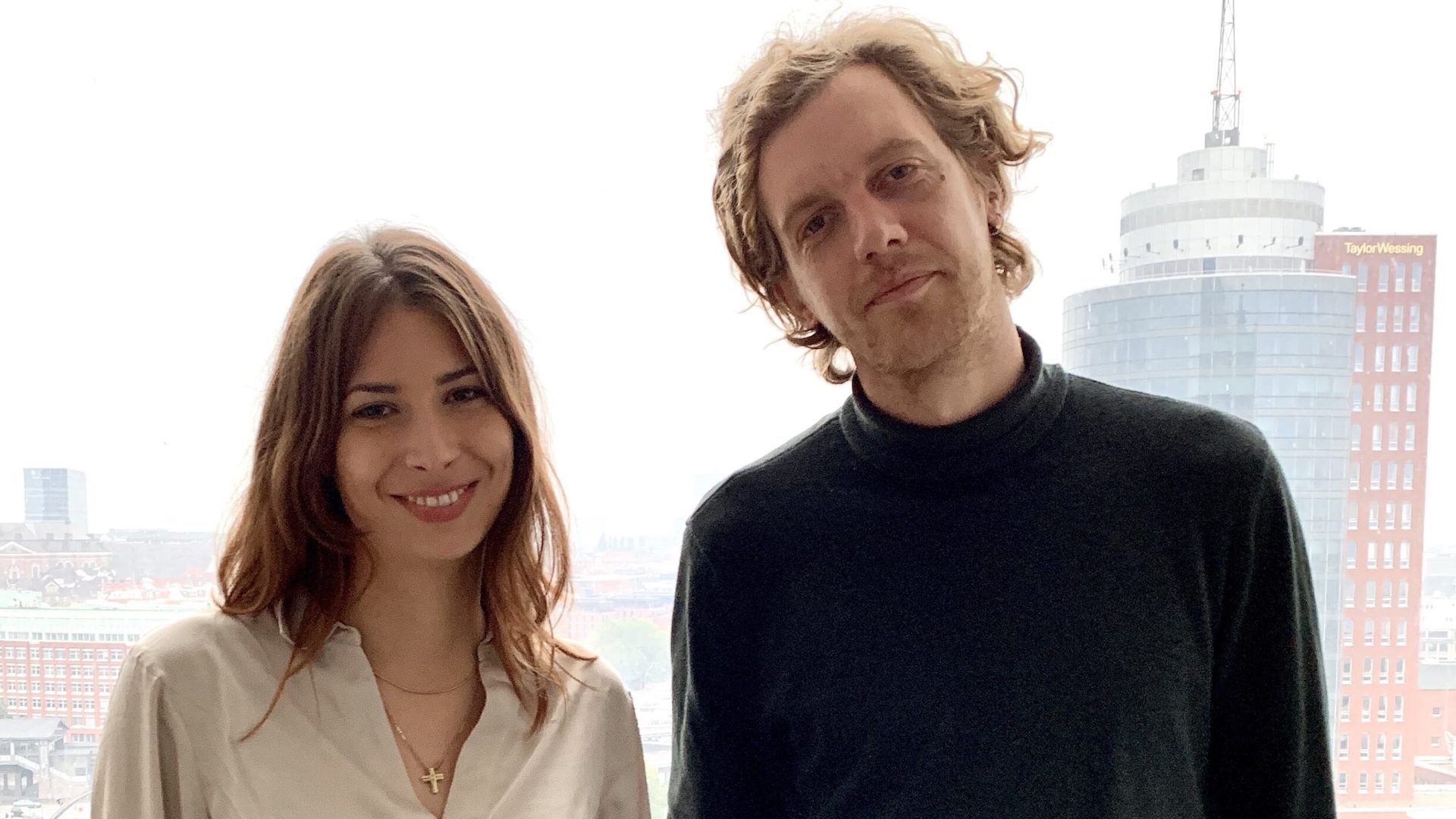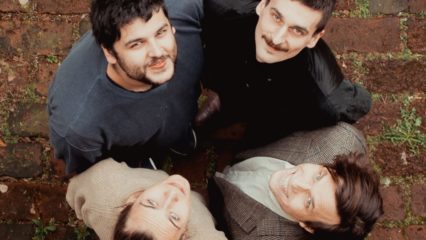Herausgekommen ist dabei ein authentisches, reflektiertes und nachdenkliches Interview über Konzepte der Muse, die neuerdings von Maarten Devoldere kritisch rezipiert werden, das Älterwerden, rollen-geschlechtliche Projektionen, Rückblicke auf den Entstehungsprozess in einem Hotelzimmer in Palermo und ein sichtlich gereifter Songwriter, der sich an seinen Idolen Bob Dylan, Serge Gainsbourg etc. inspirierend abarbeitet. Aber auch Witz und abgeklärte Paradoxie, die sich im Songtitel „Ha Ha Heartbreak“ widerspiegelt.
Sabrina hat Maarten Devoldere vor seinem ersten Warhaus-Gig nach fünf Jahren nachmittags in der Elbphilharmonie getroffen, um mit ihm über sein neues Album zu sprechen. Das Interview hört ihr hier:
Hello Maarten!
Hello!
Maarten, we’re starting by looking back on your past: As the singer of the Band Balthazar, you’ve been releasing 5 Albums since the year 2010, while the band was already founded in the year 2004. With your solo-project Warhaus you already released two albums. The first one in 2016 called “We fucked a flame into being” and the second one self-titled “Warhaus” in 2017. All together a respectable output for a man of being 35 years old.
Well, first of all I’m very confused that you know exactly how old I am (lacht).
So how did the timespan of five years since the last Warhaus album influence your songwriting nowadays? Did it change anything in the last 5 years especially regarding your solo-project Warhaus?
Oh yeah, the thing is I don’t really think in projects like “I’m going to write a Balthazar song”. What I was doing with my first album and then with my second is not anymore who I am. I mean you change. Every year you’re a different person. There’s other music that comes across your path and that inspires you. You just grow and you are a lot searching for you who are.
And if I look back at the Warhaus records, I’m proud of them, but I hear a man that is really, really in search of the man he wants to be. And I think by maturing it’s kind of nice to write because you write closer to yourself. Actually, I see it with all my heroes, all my idols, as well. For example, Bob Dylan, when he was young, he wanted to be this super intelligent poet with lots of metaphors and when he became older he started to write more simple, but still genius. You can also see it with Leonard Cohen. When you are younger you have a lot to proof and that shows in the music. That’s what I like especially now with this new record. I think when I was younger, I needed to search adventure in the nighttime mostly to draw inspiration from. But now I had my heart broken for this record and I thought “this happens to everybody” and it’s not Sex, Drugs and Rock’n’roll. It’s something universal. It takes the ground from under your feet, and you can create something very honest with it. It feels like I write closer to myself.
I wanted to ask you about the inspiration behind the new album “Ha Ha Heartbreak” but you just mentioned, that you had your heart broken, so that apparently was one of the inspirations since the title is like this.
Yes, it is really cliché. I wrote lots of breakup songs. I like to work with cliches in popmusic. I think it’s important. I like to use the word “baby”, I like to use the word “love”. The concept of a breakup-album is also one big cliché and people sometimes believe that there are so many break up albums and why would we need another one? But it’s just what popmusic is made for (lacht). As an artist it’s just so inspiring. Also, it’s a bit self-centered in a way. And I was worried whether it is too self-centered when you’re writing these kinds of songs, but they just tell something about the human condition, I hope. My experience is the more self-centered or writing closer to yourself the more people feel it and it speaks to a part of them. And this is a paradox.
Do you feel if try to write more self-centered that it’s going to be more universal with the human condition?
Yes, I think so. You can kind of tell if something is honest or not. And that is what I so love about for example a breakup-album like “Blood on the tracks” by Bob Dylan. It’s really witty, but you can also feel his pain. On the other hand, I’m also a fan of Alex Turner, I think he’s a genius and he writes such great lyrics, but sometimes I miss some kind of heart, it’s too much wittiness.
So apparently the inspiration behind the album was the breakup
Yes, that was the inspiration, but I have to say I wrote it super-fast in a hotel room in Palermo and I know that sounds super romantic, but the years before when I was happy, I was also creating music and I was making certain melodies. The biggest work in writing songs is finding good melodies and chords anyway. So I already had a whole library of ideas and then when I went to Palermo I wrote all the lyrics and everything came together very fast. In two to three weeks, I’ve made the whole record, but I could draw already from these melodies.
You mentioned it already: it’s about a breakup, and I understand it’s about the breakup with Sylvie Kreusch, whos a Belgian singer (Anm. D. Red: weibliche Vocals von Warhaus und Devolderes Ex-Freundin), who realeased her debut album “Montbray”. How does the music change since Sylvie Kreusch is not a crucial part as a female antagonist live and in your recordings?
I think the whole record is about me. I always went from relationship to relationship ever since my mother. In my last video (Anm. D.Red: Warhaus-Desire) there is a scene in which I pull out my umbilical cord. It was a metaphor for being so used to have been living in the attention of a woman next to me in a very subconscious way that I wasn’t really aware of it. But for writing this record I had to really be alone and figure out things on my own: become a man in a way, mature, get out of puberty (lacht). I wanted to work with the pain but also with the longing. I don’t want to get too psychoanalytical, but I believe it is about to get back to that mother bond. It’s about growing up in a way at a very late age.
Earlier in an interview you said that Sylvie Kreusch is “your Muse, your sister, your slave”. But you also said that you prefer her not to be around at every gig, because you don’t want to lose the aspect of the muse towards a work relation with her. Where do you get the aspect of the muse now?
The whole concept of a muse is just a very toxic thing, because it’s all projection and it’s just your male fantasies that you project on a woman. You’re talking about Sylvie, but I don’t know if the record is about Sylvie actually. However, Sylvie is a good example of being a Femme Fatale when she was on stage in whom you can project everything onto her. I just learned that it’s not reality, it’s not life and it doesn’t help me, and it doesn’t help the relationship. It’s just a toxic thing. Recently I read a quote about C.G. Jung, the psychoanalyst, and he said „artists who don’t embrace their own anima, which is their female energy, have to look for a muse“. They project it on women around them and they’re always needed, and I think I’m really guilty of that in the past. Now I think it’s a really beautiful concept that the muse is just inside of me, and I have a girlfriend now and it’s nice, but I try not to project anything on her. I just see her as a partner and a friend.
Now I understood that the isolation during corona, in which “Sand” the last album of Balthazar was produced, was not the only isolation in the past time. “Ha Ha Heartbreak” apparently came together in three weeks in the solitude of a hotelroom in Palermo. Why did you choose to lockdown yourself once again? And why Italy?
It just works really well for me. I did it with the first record on a boat, the second one as well when I went to Kirgizstan. It really works to finish it in that way. You’re really focused to finish the whole thing. What was nice about this record is that I made demos, so I had this mic with me to record. And when I had all the lyrics written I recorded everything and then I came back to Belgium, and I went to Jasper (Anm. D. Red: Maekelberg), who plays in the band and who produces Balthazar and Warhaus records. Jasper listened to the demos, and he thought there’s such a vibe in the vocal takes and that I’d never be able to recreate them. So, we worked with those demo takes and arranged them. Normally you arrange something, then you record the drums, you record the orchestra, you record everything and then in the end you sing. Now it was the other way around. We had the vocal takes and a very shitty sounding demo with a drum computer. When we started arranging the vocals, we started looking for the right grove and for the whole arrangement and we dressed it up around these vocal takes from the hotel room which was really nice. In the beginning I was worried that I wanted to perhaps change a sentence, but it was a good idea. It has something pure to it.
Do you feel that the process which you just described was a restriction or a liberation with the demos and lyrics not being changeable during the work?
It was a liberation in a sense because like you said before I already made seven records and after a while you have a certain way of working. So it’s good to turn it around to not repeat yourself so much. I’m always open for an experiment and I think Jasper did a really great job in helping me to arrange it and I’m grateful for what he did. It’s my most musical work so far, I think. It’s kind of old-school in a way, because it’s arranged like in the old days – with craftsmanship (lacht). I’m very proud of it.
A quote from an interview of yours is as followed: “The biggest challenge is to combine some maturity with approachability.” On the tracklist the Song “Open Window”, which is your first single release is not what I call a typically structured pop song with a three- to four-minute-long instrumental outro and a total of seven minutes length. Did your approach to make music change in a way like your favourite singer-songwriters Leonard Cohen, Lou Reed, Serge Gainsbourg (…) evolved as well in order of being a more sophisticated artist? That being said: do you still agree with that quote?
I don’t really agree. I think it’s super approachable. I had a discussion with the label, because they always want the single that is going to be played in the radio to be released. But I was against it and said that we’re going to release “Open Window” first, because that song is going to touch most people. And then I never had such good reactions on a track in my life. I don’t think it’s complicated, rather its very catchy in a way. Sometimes you have to feel your gut and I had a good feeling about this song and I knew it was a good move to put it out first. But when I made the demos I thought it would be the end of the album but then I thought “No, fuck it, I want this to be the introduction to the new record.”
Why did you think so? Why did you think this would be the introduction?
It’s just a feeling. It’s just very good reference to guide people in for that the album stands for.
Talking about the album title: “Ha Ha Heartbreak” sounds almost like a contrast, like a contradiction. How do you feel about this binary between laughter and heartbreak? Is something that you think is combined in life? Or why did you choose the title?
It’s combined in life: you have highs and depths. It’s a stupid answer but when you finish the album thinking about it, it is funny that you take something like a heartbreak and then you make songs out of it. You make choruses and verses and catchy melodies, and you turn it in a product. And I thought the title needs to represent the fact that I made the heartbreak catchy. I was imagining this backing vocal choir that goes like “ha, ha, heartbreak” (singt), which is not on the record. This cathy popculture aspect of what a heartbreak can be and what is used so much in music I thought would be interesting to use in the title.
If you would describe your first solo-album called “We fucked a flame into being” I the words and “Ha Ha Heartbreak”. What would it be?
“We fucked a flame into being”: Hypnotizing, tired (haha) and drugs.
“Ha Ha Heartbreak”: Sobering up, classic – it’s a bit pretentious – (lacht) and warm.
Thank you Maarten.






